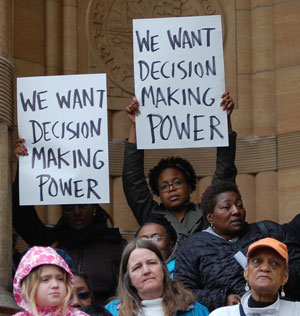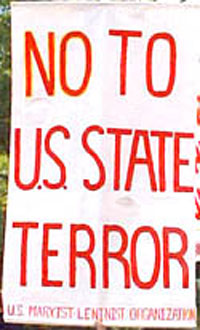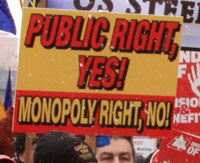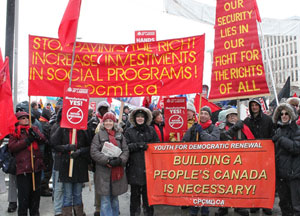Our Security Lies in Our Fight for Rights
• Obama Issues Sweeping Executive Order
• The Politicizing of Private Interests, Depoliticizing of Public Interests and Destruction of Public Assets
Obama Issues Sweeping Executive Order
 On March 16, President Barack Obama issued an Executive Order titled "National Defense Resources Preparedness." The order builds on a 1950s Defense Production Act that served the Korean War. It is largely the same as a newer version issued by President Bill Clinton in 1996. The order issued by Clinton updated the previous Act in part by adding that it applied in peacetime as well as times of war. Obama has now added language that allows the president to act without any emergency, meaning all or parts of the order can be implemented at anytime. The order deals with all facets of life including food production, water, use of energy resources and the allocation of labor, and places them under Presidential powers. It authorizes the use of Presidential powers to ensure there is an "industrial and technological base capable of meeting national defense requirements and capable of contributing to the technological superiority of its national defense equipment in peacetime and in times of national emergency."
On March 16, President Barack Obama issued an Executive Order titled "National Defense Resources Preparedness." The order builds on a 1950s Defense Production Act that served the Korean War. It is largely the same as a newer version issued by President Bill Clinton in 1996. The order issued by Clinton updated the previous Act in part by adding that it applied in peacetime as well as times of war. Obama has now added language that allows the president to act without any emergency, meaning all or parts of the order can be implemented at anytime. The order deals with all facets of life including food production, water, use of energy resources and the allocation of labor, and places them under Presidential powers. It authorizes the use of Presidential powers to ensure there is an "industrial and technological base capable of meeting national defense requirements and capable of contributing to the technological superiority of its national defense equipment in peacetime and in times of national emergency."
Most of the authorities in Obama's order are the same as Clinton's. The significance of him issuing the order now is that it is likely to be implemented, at least parts of it. Obama has added to Section 201(b) that cabinet secretaries designated “shall plan for and issue regulations to prioritize and allocate resources and establish standards and procedures by which the authority shall be used to promote the national defense, under both emergency and non-emergency conditions.” The specific cabinet secretaries included are those of Agriculture, Commerce, Defense, Health and Human Services and Transportation. The contracts and orders can deal with energy, water, food, construction, all civil transportation, and more. They also provide for government stockpiling of resources.
By including that actions can be taken in a non-emergency situation, Obama could, for example, determine that new oil pipelines and hydraulic fracturing (fracking) for natural gas are necessary for defense preparedness and prioritize and allocate funds for them despite broad opposition from the public and local and state governments. Such a move would correspond with comments Obama made in the 2012 State of Union address about drawing the Pentagon more into drilling for oil and gas and the use of public lands and funds for energy resource extraction. The order no longer requires war or even emergency conditions and thus can be implemented at anytime.
Another change was to replace the Federal Emergency Management Agency (FEMA) with the Department of Homeland Security (DHS) — which did not exist in 1996 — as the force to implement the order alongside Obama's appointed "national security" team and the cabinet secretaries listed above. DHS also includes all the border and immigration enforcement agencies, which means they too can be given priority and called to act in the name of “defense preparedness.”
Also updated in the order is the role given to National Defense Executive Reserve (NDER) units, which were established under Clinton in 1994. The units are distinct from the military, military reserve and National Guard. They are made up of "experts" from the private sector that have been trained to play their role in such units. They are to be mobilized in the event of a "national defense emergency," which the DHS Secretary can determine exists. Such emergency need not be related to any foreign invasion but rather can relate to internal matters, including those of the border, health emergencies, natural disasters, etc. Each of the five cabinet secretaries has the authority to establish NDER units in each agency, as well as the authority to “employ civilian personnel when activating all or part of its NDER unit.” Nothing in the order prevents utilizing mercenaries of the Blackwater type in such units nor using them against workers, such as longshoreman or those in the energy sector, engaged in struggles deemed harmful to “defense preparedness.” It should be remembered the President Bush threatened to use the military against west coast longshoreman.
Obama’s order also includes a section on "Labor Requirements" which links preparations for military drafts with ensuring labor power is put in the service of national security. The Order requires the Secretary of Labor to “maintain data necessary to make a continuing appraisal of the Nation’s workforce” and “upon request by the Director of Selective Service, and in coordination with the Secretary of Defense, assist the Director of Selective Service in development of policies regulating the induction and deferment of persons for duty in the armed services.”
Mechanisms for Politicizing Private Interests
The order is being issued in the context of several other guidelines, laws and court rulings that greatly expand spying, police-state terrorism that removes the requirement for even suspicion of terrorism or any real threat, and openly criminalize dissent. The Supreme Court also recently ruled that anyone arrested for any reason and put in jail can be subjected to the humiliation and brutality of cavity searches, even when there is no suspicion of anything being brought in. There is also the recent forcing of protesters arrested to provide eye-scans along with fingerprints. There is a general increase in police measures by the federal government. This is further indication that Obama’s Executive order is being issued for actual implementation, which generally has not been done in the past (apart of course from the FEMA camps put in place and the FEMA/military live exercise following Hurricane Katrina). The order is also being issued in the current context of increased war preparations and energy concerns, particularly given a potential war with Iran and Syria.
 Obama's issuance of the executive order now is no doubt tied to providing direct mechanisms to enable the general trend of politicizing private interests. It is a means for the President and his cabinet secretaries to decide which private interests get public resources — funding for projects, new technology, priority treatment — deemed necessary for "preparedness." It strengthens the President's executive decision-making power, rather than leaving things to the usual fights in Congress. It provides the President freer rein to use and direct the public budget as he wishes. This includes not only the Pentagon budget, but that for the Departments of Agriculture, Commerce, Energy and Transportation.
Obama's issuance of the executive order now is no doubt tied to providing direct mechanisms to enable the general trend of politicizing private interests. It is a means for the President and his cabinet secretaries to decide which private interests get public resources — funding for projects, new technology, priority treatment — deemed necessary for "preparedness." It strengthens the President's executive decision-making power, rather than leaving things to the usual fights in Congress. It provides the President freer rein to use and direct the public budget as he wishes. This includes not only the Pentagon budget, but that for the Departments of Agriculture, Commerce, Energy and Transportation.
Consider this example of the kind of powers the order gives to the President. The order delegates presidential powers to: "allocate materials, services, and facilities as deemed necessary or appropriate to promote the national defense [...] to the Secretary of Agriculture with respect to food resources, food resource facilities, livestock resources, veterinary resources, plant health resources, and the domestic distribution of farm equipment and commercial fertilizer."
The order defines what is meant by "food resources" and what comes under its control: "all commodities and products, (simple, mixed or compound), or complements to such commodities or products, that are capable of being ingested by either human beings or animals, irrespective of other uses to which such commodities or products may be put, at all stages of processing from the raw commodity to the products thereof in vendible form for human or animal consumption. 'Food resources' also means potable water packaged in commercially marketable containers, all starches, sugars, vegetable and animal or marine fats and oils, seed, cotton, hemp, and flax fiber, but does not mean any such material after it loses its identity as an agricultural commodity or agricultural product."
It goes on to state: "'Food resource facilities' means plants, machinery, vehicles (including on farm), and other facilities required for the production, processing, distribution, and storage (including cold storage) of food resources, and for the domestic distribution of farm equipment and fertilizer (excluding transportation thereof)."
In the case of energy resources, the order states that presidential authority will be delegated to "the Secretary of Energy with respect to all forms of energy."
Energy, according to the order, is defined as: "all forms of energy including petroleum, gas (both natural and manufactured), electricity, solid fuels (including all forms of coal, coke, coal chemicals, coal liquefaction, and coal gasification), solar, wind, other types of renewable energy, atomic energy, and the production, conservation, use, control, and distribution (including pipelines) of all of these forms of energy."
As part of provisions dealing with military draft regulations, the order authorizes the appropriation of labor for any purpose deemed to constitute "national defense." In other words, this means the deployment of labor on a slave basis to directly further war production and that issues concerning any aspect of the economy can be declared a matter of national security.
In addition, given U.S. annexation of Canada and Mexico and their integration into U.S. Homeland Security and military command through NORTHCOM and NORAD, the danger this order poses to Canadians and Mexicans, as well as to the U.S. working class and people, cannot be underestimated.
[TOP]
The Politicizing of Private Interests,
Depoliticizing of Public Interests
and Destruction of Public Assets
 At the federal level, as with the provinces and Quebec, the state is at the disposal of the monopolies. This is not new. What is new is the speed with which final touches are being put on new arrangements which have been brought into being for the last twenty years. These new arrangements provide the interests of the most powerful monopolies in the Anglo-American sphere of interest with everything they require to compete successfully in what is called the global market. These arrangements started in the mid-1980s with free trade deals which rang the death knell for the social welfare state and ushered in the new neoliberal phase of state-monopoly capitalism. Today, the state is used to destroy the sovereign public institutions and make sure the interests of the most powerful monopolies and their oligopolies trump all other interests that stand in their way.
At the federal level, as with the provinces and Quebec, the state is at the disposal of the monopolies. This is not new. What is new is the speed with which final touches are being put on new arrangements which have been brought into being for the last twenty years. These new arrangements provide the interests of the most powerful monopolies in the Anglo-American sphere of interest with everything they require to compete successfully in what is called the global market. These arrangements started in the mid-1980s with free trade deals which rang the death knell for the social welfare state and ushered in the new neoliberal phase of state-monopoly capitalism. Today, the state is used to destroy the sovereign public institutions and make sure the interests of the most powerful monopolies and their oligopolies trump all other interests that stand in their way.
An oligopoly is a cartel of the most powerful monopolies in a particular field. They come together in an arrangement that permits them to collude with one another to eliminate rivals, get states to do their bidding, fix prices, destroy unions and engage in other activities to serve their interests. Definite activities and things favour the common interests of all the monopolies within a sector, as with the destruction of the Canadian Wheat Board. The executive power at the federal level enacted a new law that destroys the CWB's single- desk marketing board. The need for the new law is not based on any public interest but to further powerful outside private interests. The Parliament, an institution constituted to enshrine the popular will in the form of the legal will and thus represent public opinion, has been, so to speak, hijacked to enact legislation that favours private not public interests. This can be characterized as the destruction of the sovereign decision-making power as a result of the politicization of private interests.
The use of public institutions and funds to further private interests poses a serious problem of legitimacy. To address this problem, a raison d'état is provided in the form of irrational arguments saying for "reasons of state" certain private interests must be provided unfettered right to access all of Canada's resources as they see fit. The irrational arguments are couched in language of national interest. Similarly, obstacles standing in the way of what is called national interest are presented as criminal, treasonous, terrorist or in other ways targeted for removal.
 Not all changes brought in to justify the new raison d'état require new laws. Many are brought in through regulation, as in the case of the new Canada/U.S. border arrangements. Supra-national non-elected bodies have been established that have discretion to achieve their aim, whether security or emergency relief or anything else. The focus becomes the homeland and guaranteeing its security from external and internal subversion. Agencies charged with security, border arrangements and defence, which the people believe to be under the civil power, are transformed into powerful privatized interests and in many cases taken over by private contractors.
Not all changes brought in to justify the new raison d'état require new laws. Many are brought in through regulation, as in the case of the new Canada/U.S. border arrangements. Supra-national non-elected bodies have been established that have discretion to achieve their aim, whether security or emergency relief or anything else. The focus becomes the homeland and guaranteeing its security from external and internal subversion. Agencies charged with security, border arrangements and defence, which the people believe to be under the civil power, are transformed into powerful privatized interests and in many cases taken over by private contractors.
To explain the arrangements being put in place today in Canada, the United States and other countries, the Prime Minister and other ministers, the President of the United States, other prime ministers, presidents and ideologues of the global monopoly interests give "reasons of state" based on the requirements to secure the global monopoly interests they represent. The arrangements and reasons of state are centred on politicizing the private interests of the global monopolies, depoliticizing the public interests of the people and destroying their public assets and nation states.
Whether the executive power enforces the private monopoly interests by establishing non-elected appointed boards that oversee the implementation of new regulations or by getting legislatures to pass new laws to uphold monopoly interests, all is deemed constitutional. The governing bodies constituted to rule based on the rule of law are taken over and become dysfunctional while life is taken over by bodies established through ministerial and presidential prerogative. The powers used to do this are described in the Constitution as residual powers. They are not under the mandate of the Commons, legislatures, Congress etc. They are unlimited in the sense that unless the Commons, legislatures, Congress or another power can restrict them in practice, they are unfettered.
These changes come under the domain of the constitutionally sanctioned prerogative powers of the office of the Prime Minister, President or ministries organized to serve the privatized interests. Their arrogance stems from the use of arbitrary powers with impunity. Rule by exception is no longer the exception; it has become the rule. Rule by exception is beyond the rule of law and can be described with the expression "anarchy raised to authority."
Problems emerge as a result of the push to bring this new regime into being. The anarchy and violence created when the public system is destroyed in favour of private interests means that the ruling elite itself clamours for regulations to satisfy their need to predict the outcome of financial investments. Internationally, the politicized and competing private interests are a major cause for a new inter-imperialist war for the re-division of the world into new spheres of influence, zones for the export of capital and sources of raw material and cheap labour. Another problem for the new regime is to ensure an organized resistance of the working class and peoples of the world is successfully suppressed.
 In Canada, all kinds of changes are being made to the state arrangements in a manner that does not require opening or changing the Constitution. End of year/new year media interviews informed Canadians that the Governor General and Prime Minister have restarted the practice of regular consultations to make sure all changes are done in conformity with the Constitution. An impression was conveyed that when a change conforms to the Constitution, it is not above the rule of law. Ipso facto the change is democratic and okay. The reality remains however that the change can be constitutional by falling under the residual arbitrary powers of the executive and not be okay at all. The change, such as Bill C-18 to destroy the Canadian Wheat Board, serves alien private monopoly interests not the public interests of the Canadian people constituted as a sovereign body politic mandated to uphold what was historically established as comprising the public good or interest.
In Canada, all kinds of changes are being made to the state arrangements in a manner that does not require opening or changing the Constitution. End of year/new year media interviews informed Canadians that the Governor General and Prime Minister have restarted the practice of regular consultations to make sure all changes are done in conformity with the Constitution. An impression was conveyed that when a change conforms to the Constitution, it is not above the rule of law. Ipso facto the change is democratic and okay. The reality remains however that the change can be constitutional by falling under the residual arbitrary powers of the executive and not be okay at all. The change, such as Bill C-18 to destroy the Canadian Wheat Board, serves alien private monopoly interests not the public interests of the Canadian people constituted as a sovereign body politic mandated to uphold what was historically established as comprising the public good or interest.
As for being democratic, what Canadians perceive to be true is fundamental to the system's survival. The elected bodies must be seen to be democratically elected and the laws they pass must be seen to be passed democratically. A majority government such as Stephen Harper's is considered arrogant and abusive because it is arrogant and abusive. But this does not mean his majority government is acting illegally per se. It is acting within what the government and its advisors deem to be the prerogative powers given to its executive by the Constitution. Prior to the passing of Bill C-18, the legislation to dismantle the single desk marketing wheat board, the Manitoba Court declared the Bill above the rule of law. However, the Court did not declare it unconstitutional. The government sees itself as having duly introduced and passed the new law in Parliament. How to explain why the Harper government seems so certain that its new law cannot be declared unlawful despite not carrying out a referendum amongst western grain farmers as required by the previously existing law? Is this because, using the Constitution as its guide, it will argue that all matters of regulation come under the arbitrary powers of the ministers and it considers that the consultation mandated by the prior law pertains to some regulations about which grains are included in the single desk? Whatever argument is used, it is self-serving because it serves private interests, not the public interest.
In part, the arrogance of the government can be explained by its belief that no one can stop it and so it can get away with just about anything. It argues that according to the democratic process, the government can be judged at the next general election but of course that is no longer true. Today, similar changes are being wrought in the arrangements to elect what are called democratic institutions as are being wrought in all other fields. Governments in the service of the most powerful private interests use those private interests, such as public relations marketing firms, media manipulation, new "knowledge based" companies and so on, to get the election results they require. The political parties and public institutions have become dysfunctional which means that organized political expressions are either rare or no longer exist. The citizenry has become depoliticized along with public interests and public assets destroyed; meanwhile private interests are politicized.
Opposing the state's subservience to the dictatorship of the most powerful monopolies forms part of the work for political renewal. Modern political renewal must favour the working class and people of Canada, as well as the United States and peoples of the world. Modern political renewal requires a new direction for the economy that does not put all the assets of the country at the disposal of the cartels of giant monopolies. The actions of those cartels cause irreparable harm to the overall socialized economy and undermine the right to be of First Nations. Their actions seek to turn the working class into a dehumanized slave labour force. All is done in the name of the national interest, economic prosperity and homeland security, which in reality serves the private interests of the monopolies.
It is important for the working people to recognize and discuss seriously the ruling elite's self-serving justifications for the new arrangements they are putting in place where powerful private interests are politicized. Those private interests are being given government sanction in the form of laws, regulations and public monies. Hitherto public interests represented by the legislatures and public institutions and agencies are being destroyed or have become dysfunctional creating a profound crisis. The people must occupy the space for change and take practical steps to make sure the crisis is resolved in their favour. The disasters the imperialists and their henchmen have unleashed can be stopped and turned around with an alternative organized and driven by the people themselves. (TML Weekly, cpcml.ca)
[TOP]
